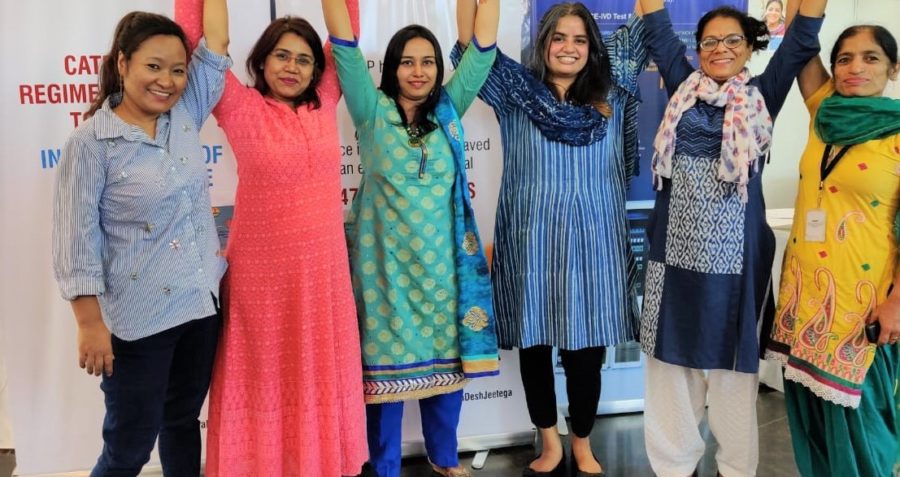Why communities are essential to respond to TB, HIV and now COVID-19
 © India HIV/AIDS Alliance
© India HIV/AIDS Alliance
Since 1994, Frontline AIDS has been working with partners around the world to address tuberculosis (TB) and HIV co-infection through community-led responses.
The new health threat from COVID-19 highlights just how critical person-centred community systems are to effectively address HIV and AIDS, and tuberculosis, especially for people who can’t afford or access health care.
On World Tuberculosis Day (24 March), we stand in solidarity with people affected by COVID-19, alongside those living with TB and HIV.
Closer collaboration is needed between HIV and TB organisations
TB remains the leading cause of death among people living with HIV, accounting for around one in three AIDS-related deaths. Many of these deaths could be prevented if people living with HIV were correctly diagnosed with TB and initiated on treatment early, and successfully completed the treatment.
Sanssan Kambou, TB programme manager at Frontline AIDS partner, Alliance Cote d’Ivoire, says: “There is a lot of stigma towards people with tuberculosis, including in health care settings and among people living with HIV. They are afraid to contract TB and prefer to stay away. Time and resources invested in communities affected by TB needs to increase significantly so they have skills and knowledge to engage more effectively in advocacy and service delivery. We are working with the government to develop standard operating procedures and formulate a proposal to the Global Fund which aims to strengthen synergies between tuberculosis and HIV work.”
Such action is urgently needed around the world to improve links between HIV and tuberculosis programmes to prevent barriers and bottlenecks in diagnosis and treatment. Community systems are also essential to ensure people maintain the treatment regimen until completion, to ensure TB doesn’t come back stronger and resistant to treatment.
Harjyot Khosa, regional advocacy advisor at India HIV/AIDS Alliance, says: “Firstly, partnerships and engagements with the most marginalised communities are essential to address TB effectively and this requires resources. Secondly, it is important to work collaboratively with communities in order to engage the hardest to reach people in TB programmes. We are particularly concerned with reaching the families of people living with HIV, as well as sex workers, transgender people, men who have sex with men and people who inject drugs.”
In Ukraine, Alliance for Public Health works closely with the Ministry of Health, people living with HIV, people with TB and civil society organisations to implement HIV and TB activities. These projects have improved detection of co-infected people in population groups most at risk. During 2019, 11,000 marginalised people were screened for HIV of which 7,500 received TB diagnostics services in healthcare facilities. TB was diagnosed in 412 people, 387 were enrolled on treatment. 102 people were diagnosed with TB and HIV simultaneously within the project.
Zahedul Islam, director of treatment at Alliance for Public Health, says: “Access to TB prevention, diagnostics and treatment must be ensured for marginalised people.”
Community-led responses are key for preventing HIV-TB deaths and fighting COVID-19
Worldwide, it is estimated that 49% of people living with HIV and tuberculosis are unaware of their co-infection and are therefore not receiving care. Community systems are at the heart of building resilient health systems to prevent, detect and respond effectively to epidemics – those we continue to battle, and new outbreaks like COVID-19. But in many countries, they remain marginal to the mainstream health care systems, and this must change.
“In India, the Ministry of Health is working with civil society organisations to increase cross-referrals for diagnosis and treatment of TB from antiretroviral centres, and vice-versa,” says Harjyot. “We are happy that the government recognises community engagement and feedback is critical to improve the reach and sustainability of this work.”
In 2018, three million people with tuberculosis were “missed” by public health systems – undiagnosed, untreated or unreported. “Community workers and knowledge in community organisations are key to detecting TB among people living with HIV. Healthcare systems in most African countries will not be able to cope if COVID-19 spreads and the impact will be catastrophic. We need to start preparing today with partners across all sectors,” says Kambou.
The latest WHO guidance indicates that people who are ill with both TB and COVID-19 may have poorer treatment outcomes, especially if TB treatment is interrupted.
Andrey Klepikov, executive director of Alliance for Public Health, says: “In the months to come we will be working to address the impact of COVID-19 within our HIV and TB programmes. At the same time, World TB Day is an opportunity to stop and reflect about lessons learnt from TB and HIV that are critical in addressing COVID-19, from community-led responses to protection of human rights.”
Today people all around the world have a new understanding of the isolation and challenges that people living with HIV and TB can face. With this new understanding could come a new era, where humanity stands shoulder to shoulder and together fights every epidemic with the same urgency we are giving to COVID-19.
Tags
COVID-19Tuberculosis (TB)


